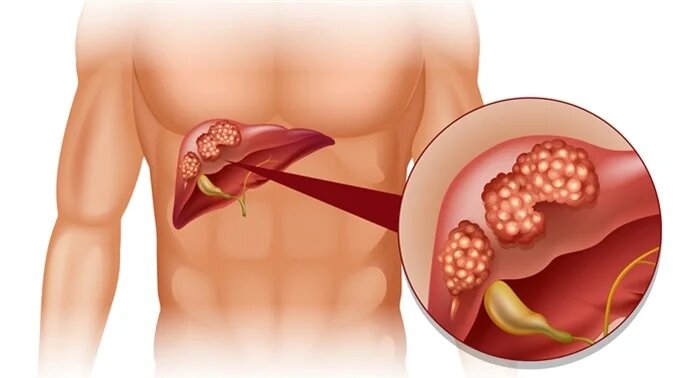liver cancer
Signs and symptoms
 Most people have no signs or symptoms in the early stages of primary liver cancer. When signs and symptoms appear, they may include:
Most people have no signs or symptoms in the early stages of primary liver cancer. When signs and symptoms appear, they may include:
Lose weight without trying.
Loss of appetite.
Upper abdominal pain.
Nausea and vomiting.
General weakness and fatigue.
Abdominal swelling.
Yellow discoloration of your skin and the whites of your eyes (jaundice)
When to see a doctor?
Make an appointment with your doctor if you experience any signs or symptoms that worry you.
The causes of liver cancer
Liver cancer occurs when liver cells develop changes ( mutations) in their DNA. A cell's DNA is the material that provides instructions for every chemical process in your body. DNA mutations cause changes in these instructions. One result is that cells can begin to grow out of control and eventually form a tumor - a mass of cancerous cells.
Sometimes the cause of liver cancer is known, as in the case of chronic hepatitis. But sometimes liver cancer occurs in people with no underlying disease and it is not known what causes it.
Risk factors
Factors that increase the risk of primary liver cancer include:
Chronic HBV or HCV infection. Chronic infection with hepatitis B virus (HBV) or hepatitis C virus (HCV) increases your risk of liver cancer.
Cirrhosis. This progressive and irreversible disease causes scar tissue to form in your liver and increases your chances of developing liver cancer.
Some hereditary liver diseases. Liver diseases that can increase the risk of liver cancer include hemochromatosis and Wilson's disease.
Diabetes. People with this blood sugar disorder are at greater risk of liver cancer than those without diabetes.
Non-alcoholic fatty liver disease. An accumulation of fat in the liver increases the risk of liver cancer.
Exposure to aflatoxins. Aflatoxins are poisons produced by molds that grow on poorly stored crops. Crops, such as grains and nuts, can be contaminated with aflatoxins, which can end up in foods made from these products.
Excessive alcohol consumption. Consuming more than a moderate amount of alcohol per day for many years can lead to irreversible liver damage and increase your risk of liver cancer.
Reduce your risk of cirrhosis
Cirrhosis is scarring of the liver and increases the risk of liver cancer. You can lower your risk of cirrhosis if you:
Drink alcohol in moderation, if at all. If you choose to drink alcohol, limit the amount you drink. For women, that means no more than one drink a day. For men, that means no more than two drinks a day.
Maintain a healthy weight. If your current weight is healthy, try to maintain it by choosing a healthy diet and exercising most days of the week. If you need to lose weight, reduce the number of calories you eat each day and increase the amount of exercise you do. Try to lose weight slowly - 1 or 2 pounds (0.5 to 1 kilogram) every week.
Get vaccinated against hepatitis B
You can reduce your risk of getting hepatitis B by getting the hepatitis B vaccine. vaccine can be given to almost anyone, including infants, the elderly, and people with weakened immune systems.
Take steps to prevent hepatitis C
There is no vaccine for hepatitis C, but you can reduce your risk of infection.
Know the health status of any sexual partner. Do not engage in unprotected sex unless you are sure your partner is not infected with HBV, HCV or any other sexually transmitted infection. If you don't know your partner's health, use a condom every time you have sex.
Do not use intravenous (IV) medication, but if you do so, use a clean needle. Reduce your risk of HCV by not injecting illegal drugs. But if that's not an option for you, make sure any needle you use is sterile and don't share it. Contaminated drug paraphernalia is a common cause of hepatitis C infection. Take advantage of needle exchange programs in your community and consider getting help for your drug use.
Look for safe and clean stores to get a piercing or a tattoo. Needles that are not properly sterilized can spread the hepatitis C virus. Before getting a piercing or tattoo, visit stores in your area and ask staff members about their safety practices. If a store's employees refuse to answer your questions or don't take your questions seriously, take it as a sign that the establishment isn't right for you.